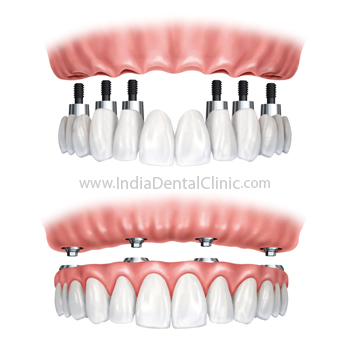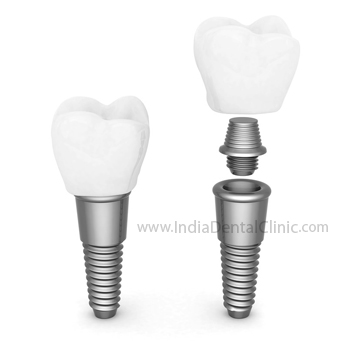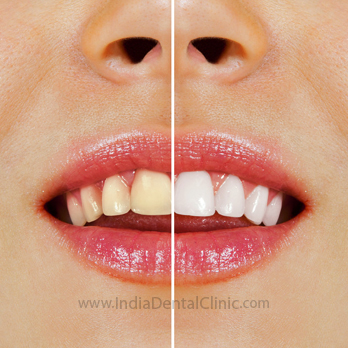Dental Bridges
More On Prosthodontics
Chipped Broken ToothDental Implant Bridges
About Prosthodontics
Crowns & Bridges
Crowns
Dental Implants
Dentures & Partials
Implant Overdentures
Inlays & Onlays
Veneers
Bridging the Gap with a Dental Bridge at India Dental Clinic
A dental bridge is a device that replaces missing teeth. A space is created when a tooth has fallen out or been removed. A typical dental bridge fills it with artificial teeth that are anchored to adjacent teeth or implants. Most bridges are made of a pontic tooth (or false tooth), held together by two crowns (a "cap" that covers the tooth, approximating its normal size and shape). Also relatively called a partial denture, a bridge may be permanently attached (fixed) or removable and may last five to seven years or longer. Without the use of a dental bridge, spaces in the mouth from missing teeth can cause multiple teeth to shift, lead to occlusion (biting) and/or jaw problems and spur periodontal disease. Dental bridges safeguard the integrity of existing teeth and help maintain a healthy, vibrant smile, proving efficacy of tooth replacement dentistry India.
The chosen Indian dentists/prosthodontist at the India Dental Clinic offers numerous types of affordable dental bridge work in India, which can be made from various materials by the dental labs in India. Factors that influence this decision include the location of the bridge in the mouth (e.g., visible or not visible area) and patient preference and dental health. In a conventional or traditional bridge, the artificial teeth, or pontics, are attached to natural abutment teeth located on either side of the gap. A cantilever bridge is attached to only one abutment and the other side is not anchored. In a Maryland bridge, the pontics are attached by a metal framework that is bonded directly to the abutment teeth along the back of the teeth. An implant-supported bridge is anchored to implants that are attached to the jaw.
Fixed Dental Bridge
Examples of Span of Bridge
Materials frequently used in bridges include:
Full gold alloy bridges: While these are not that common anymore, it is possible to cast and cement solid gold bridges. Composed of a combination of gold, copper and other metals, these materials are tough and strong. They are highly resistant to tarnishing, corrosion, fracture and wear. These materials do not tend to require as much removal of healthy tooth material as other bridge materials. They are gentle to the nearby teeth and are well tolerated by patients. However, many patients do not like the metallic gold color.
Base metal alloys: These materials are composed of a combination of base metals and are quite tough. They are highly resistant to fracture, wear, tarnishing and corrosion. However, they have a metallic silver color that many patients do not like. Sometimes they may also cause an allergic reaction or initial discomfort with hot and cold in some patients.
Porcelain Dental Bridge: These are composed of porcelain, ceramics or glasslike materials. These materials have a color and translucency that closely matches natural teeth, and highly recommended by cosmetic dentist abroad and in India They are also highly resistant to wear. However, they may become prone to fracture eating very solid foods and can wear down nearby teeth if the porcelain surface becomes rough. You may discuss the India dental bridge work options with the chosen dentist at India Dental Clinic.
Porcelain fused to metal (PFM): These are more commonly sought teeth bridges at dental clinics in India, and have the added advantage of having a metal substructure for rigidity and marginal fit. The combination is composed of porcelain crown bonded to a metal base. It is strong and durable and highly resistant to wear. However, it can wear down nearby teeth if the surface of the porcelain in PFM Bridge becomes rough due to more solid foods. It may also cause an allergic sensitivity or initial discomfort with hot and cold in some patients.
Composite resin: This material tends to be relatively inexpensive and looks like natural teeth. However, since these are composed of a type of composite plastic, it may stain more readily than porcelain. This material is not as strong or durable as porcelain, but also does not excessively wear down nearby teeth. These materials or combinations of these materials can be used to produce many different types of bridges.
Options in types of dental bridges in India:
There are three types of dental bridges regularly made available.
1) Bonded (Maryland) dental bridges uses the adjacent teeth to help support the bridge. The resin bonded is primarily used for your front teeth. Less expensive, this bridge is best used when the abutment teeth are healthy and don't have large fillings. The false tooth is fused to metal strips that are bonded to the abutment teeth with a resin which is hidden from view. This type of bridge reduces the amount of preparation on the adjacent teeth. This is achieved by bonding a very thin piece of metal or tooth-colored material to the back of the adjacent teeth, which holds the replacement tooth in place. Bonded bridgeworks depend on the strength of the bonding, and unfortunately one out of four bonded bridges comes off within the first five years. However, the advantage is that there is no damage done to the adjacent teeth.
2) Cantilevered dental bridges are recommended by dentists when there are only teeth on one side of the gap. It takes one adjacent tooth to support the bridge and can work similar to bonded bridges, by attaching a piece of material to the back of the tooth, but typically involve using a full crown to support the missing tooth. These are used only in areas of your mouth that are under less stress, such as your front teeth. Cantilever bridges are used when there are teeth on only one side of the open space. This procedure involves anchoring the false tooth to one side over one or more natural and adjacent teeth. The traditional bridges have a crown on either side of the pontic, while in contrast the cantilever bridges consist of two side-by-side crowns and only one is connected to the pontic. By using a crown these bridges last much longer than bonded bridges, however they do affect the adjacent tooth because it has to be grinded down in order to place the crown.
3) Conventional dental bridges procedure is used to replace one or more missing teeth. Conventional bridges utilise crowns on the existing teeth at each end of the gap with an additional tooth hooked together to support the replacement tooth. A false tooth known as a pontic is fused between two crowns to fill in the area left by a missing tooth. These two crowns hold it in place that is attached onto your teeth on each side of the false tooth. This is known as a traditional fixed bridge. Fixed bridges cannot be taken out of your mouth as you might do with removable partial dentures. This is usually the bridge of choice when the adjacent teeth already need to be crowned for other reasons.
Dental Bridge Work Process
Dental bridges in India usually require two or more trips to the dentist's office listed with India Dental Clinic. A bridge is a type of indirect restoration. Before a bridge can be created and placed, a patient needs to have an initial consultation and evaluation by a general dentist or a prosthodontist at the chosen dental clinic India. This will include a dental examination and a medical and dental history. During the initial visit, the surrounding teeth are numbed with a local anesthetic. The dentist prepares the surrounding teeth by cleaning any plaque or decay that remains and reducing them so that the dental crowns can be fitted. The dentist makes a mold of the teeth and sends it off to a dental lab, where the customized impression is prepared. The customized mold takes one to two weeks to return to the office. In the interim, patients are fitted with a temporary dental bridge constructed of acrylic resin. When the patient returns to the dental office, the dentist removes the temporary dental bridge and replaces it with the permanent one. The dentist then adjusts the dental bridge for the proper bite and fit, and the dental bridge is permanently bonded into the mouth.
The cost of dental bridge in India
The international patients visiting India Dental Clinic fully enjoy cost effective dental care and cheap India tours. The cost of dental bridges in India is normally based on per tooth. Besides, numerous advantages of a bridge, one also pays in the form of common disadvantages. They can break, chip or crack if not taken proper care of. In addition, healthy teeth must be prepared to serve as abutments by cutting away tooth enamel. This may weaken a healthy tooth. Poorly-fitting bridges can cause sores and irritations. If taken good care of, dental bridges are expected to last anywhere from 10 to 15 years on average.
More dental deals in Other Cities

Dental Implants
Special Price - 32500 (INR-Indian Rupee )Treatments Covered-
- Implant Bridges
- Dental Implants
- Dental Implant Consultation
View Details Gurgaon

Special discount packages on Implant and Lasers
Special Price - 30000 (INR-Indian Rupee )Treatments Covered-
- Full Arch Implant Bridges (U&L)
- Laser Teeth Whitening
- Invisalign
- Dental Implants
View Details Bengaluru

Dental Treatment Discount on Christmas
Special Price - 3500 (INR-Indian Rupee )Treatments Covered-
- Cosmetic Dentistry Consultation
- Professional Teeth Whitening
- Teeth Cleaning
- X-rays
View Details Kochi

